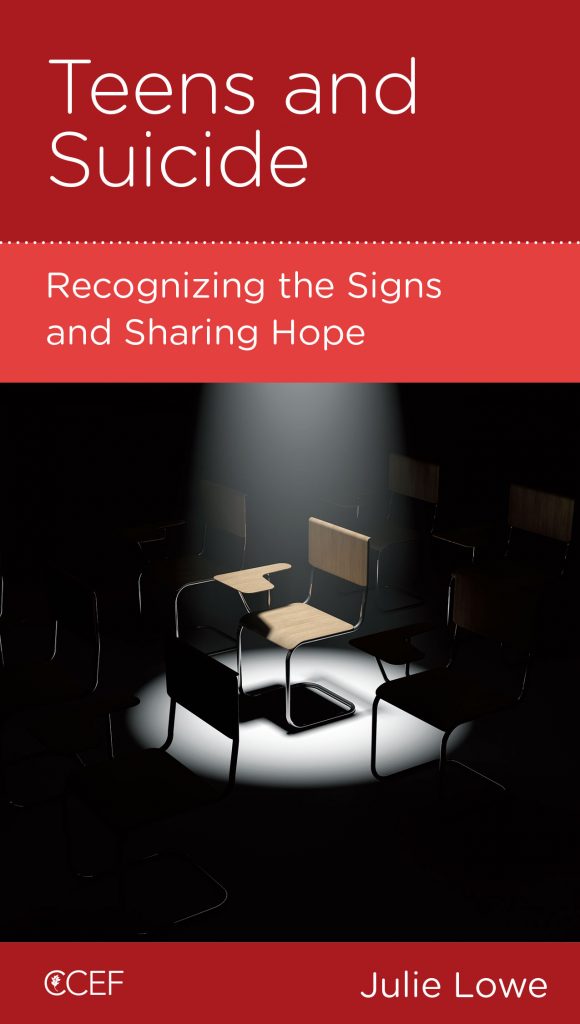In 2018, suicide was the second leading cause of death for young people between the ages of ten and twenty-four, resulting in the loss of 6,807 lives in the US. An article in USA Today cites statistics that show that between 2006 and 2016, youth and teen suicide rates increased 70% for white youth and 77% for African American teens. Clearly, we are facing a crisis. An increasing number of teens feel unable to manage the pressures and angst in their lives. They feel overwhelmed by hopelessness, with no sustaining sense of purpose. After a while, suicide is seen as their only means of escape. These kids need to know that life—their life—has meaning, and is worth living.
As both a mother and a counselor of children and families, this trend of teen suicide is of great concern to me. And though the Bible does not address suicide at great length, it has much to say about the meaning and purpose of our lives, and gives us ample reasons for hope even when we feel overwhelmed by pain, suffering, and loss. Our problems and failures do not have the final say. That belongs to God, who can and does redeem all that has been broken.
Culture’s Influence on Our Teens
Many of you are familiar with a Netflix series that debuted several years ago and captured the attention of middle and high schoolers alike. 13 Reasons Why was based on a novel written by Jay Asher. After classmate and love interest, Hannah Baker, commits suicide, Clay Jensen is left reeling to understand why. He returns home from school to find a package with his name on it lying on his porch. Inside, he discovers several cassette tapes recorded by Hannah. She tells him that there are thirteen reasons why she decided to end her life. Clay is one of them. If he listens, he’ll find out why.
If there is anything positive in the message of the series centered around teen suicide, it is that choices have consequences (at times, very serious ones) and that we all must take responsibility for our own actions. However, this valid message is greatly overshadowed by the graphic brutality, sexuality and corruption that is displayed as fairly “normal” for kids this age. And though these activities and beliefs may be normal for some adolescents, these programs create a distorted sense of what is typical for American teen culture and set a bad precedent for the average teen/preteen who is watching.
I could rail on the reasons this series should not be targeted to young people and the risks it creates for other youths to take steps similar to Hannah Baker. However, there is something valuable I took away from this story. It is this: Kids need reasons why they should live. They need to find meaning and identity in things that genuinely fulfill. They need hope. And they need to learn how to live.
Ensuring Our Kids Know Why Life is Worth Living
Have we given our kids 13 reasons why life is worth living? Have we fostered conversations about hard topics? Have we convinced them that no subject is too hard for us to hear, no issue is off limits, and that we can handle even the most intimate details of their lives with genuine love and concern? We must be proactive and foster connections with our young people. When they are tempted to believe what we have to say is inconsequential or inadequate, we must work tirelessly to engage them, proving our value in their lives.
Let teens know they are not alone. Be proactive in addressing hard topics when they are young, before the issues even enter their world. Be a redemptive guide speaking into the corruption they will be forced to wade through. Let them know there is One who fights on their behalf.
Here are 13 reasons you can give your children for why life is worth living:
1. You are not alone.
“Even though I walk through the darkest valley, I will fear no evil, for you are with me. Your rod and your staff, they comfort me.” (Psalm 23:4)
2. You have value.
“You are a chosen people, a royal priesthood, a holy nation, God’s special possession, that you may declare the praises of him who called you out of darkness into his wonderful light.” “Don’t be afraid. You are worth more than many sparrows.” (1 Peter 2:9; Matthew 10:31)
3. God cares about your tears.
“God will wipe away every tear from their eyes; there shall be no more death, nor sorrow, nor crying. There shall be no more pain, for the former things have passed away.” (Revelation 21:4)
4. You can find help.
“God is our refuge and strength, a very present help in trouble.” “We do not have a High Priest who cannot sympathize with our weaknesses, but was in all points tempted as we are, yet without sin. Let us therefore come boldly to the throne of grace, that we may obtain mercy and find grace to help in time of need.” (Psalm 46:1; Hebrews 4:15-16)
5. Your life has purpose.
“I know the plans I have for you, declares the LORD, plans for welfare and not for evil, to give you a future and a hope.” (Jeremiah 29:11)
6. What you are going through is temporary.
“Do not lose heart. Though our outer self is wasting away, our inner self is being renewed day by day. For this light momentary affliction is preparing for us an eternal weight of glory beyond all comparison, as we look not to the things that are seen but to the things that are unseen. For the things that are seen are transient, but the things that are unseen are eternal.” (2 Corinthians 4:16-18)
7. There is a good way forward, even when life is hard.
“No temptation has overtaken you that is not common to man. God is faithful, and he will not let you be tempted beyond your ability, but with the temptation he will also provide the way of escape, that you may be able to endure it.” (1 Corinthians 10:13)
8. You are more than your outward appearance.
“The Lord does not look at the things people look at. People look at the outward appearance, but the Lord looks at the heart.” (1 Samuel 16:7)
9. You cannot imagine what good lies in store for you.
“No eye has seen, nor ear heard, nor have entered into the heart of man—the things which God has prepared for those who love him.” (1 Corinthians 2:9)
10. You will not always feel this way.
“We are hard-pressed on every side, yet not crushed; we are perplexed, but not in despair; persecuted, but not forsaken; struck down, but not destroyed.” “For his anger lasts only a moment, but his favor lasts a lifetime; weeping may stay for the night, but rejoicing comes in the morning.” (2 Corinthians 4:8-9; Psalm 30:5)
11. You are greatly loved.
“I have loved you with an everlasting love; I have drawn you with unfailing kindness.” “How wide and long and high and deep is the love of Christ.” (Jeremiah 31:3; Ephesians 3:18)
12. You will not be put to shame.
“Do not be afraid; you will not be put to shame. Do not fear disgrace; you will not be humiliated. You will forget the shame of your youth and remember no more the reproach of your widowhood.” “Let your conduct be without covetousness; be content with such things as you have. For he himself has said, ‘I will never leave you nor forsake you.’ So we may boldly say: ‘The LORD is my helper; I will not fear. What can man do to me?’” (Isaiah 54:4; Hebrews 13:5-6)
13. God is up to good in your life.
“You intended to harm me, but God intended it for good to accomplish what is now being done, the saving of many lives.” “We know that in all things God works for the good of those who love him, who have been called according to his purpose.” (Genesis 50:20; Romans 8:28)
As parents, live out these reasons yourself! When you talk with your kids, put these reasons into your own words, adorned with your life experience and theirs. And, as appropriate, point them to Scripture where God gives these reasons. Help them to connect the dots from God’s promises to their struggles. The goal is not to quote Scripture at our kids, but to bring truth to life in relevant words and actions. We want to help them see that the Bible speaks of far more than correction and rules. It speaks of life and freedom and personal relationship with a God who knows what is going on in their lives.
The challenge is to winsomely and convincingly speak such truths into their experiences. And, when God is present, you will find that there are far more than 13 reasons life is worth living. So keep looking and listening to our living, loving God!
Teens and Suicide: Recognizing the Signs and Sharing Hope
Family and children’s counselor Julie Lowe takes a look at some of the reasons teenagers are increasingly vulnerable to suicide and what factors lead to it. She offers helpful advice for all those who work with teenagers to recognize suicide warning signs and shares ways to guard against hopelessness and help them find reasons to live.
This blog post was adapted from content from Teens and Suicide © 2021 by Julie Lowe and from blog posts written by the author on the CCEF blog.
Photo by Becca Tapert on Unsplash





